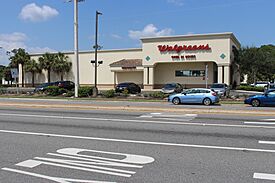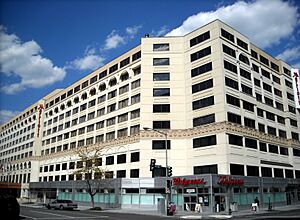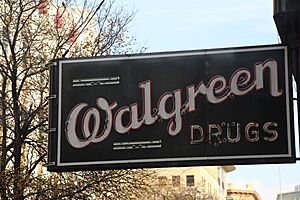Walgreens facts for kids
 |
|
|
Trade name
|
Walgreens |
|---|---|
|
Formerly
|
Walgreen Drug CO (1901–31) Walgreen Drug Stores (1931–48) Walgreen's (1948–55) |
| Subsidiary | |
| Industry | Retail |
| Founded | 1901 in Chicago, Illinois, U.S. |
| Founder | Charles Rudolph Walgreen |
| Headquarters | 200 Wilmot Road, , |
|
Area served
|
United States |
|
Key people
|
|
| Products |
|
| Parent | Walgreens Boots Alliance |
Walgreens is a big American company that runs many drugstores. It's the second largest pharmacy chain in the United States, right after CVS Health. Walgreens helps people get their prescriptions, offers health and wellness products, gives health information, and even has photo services.
The company started in Chicago in 1901. Its main office is now in Deerfield, Illinois, which is a suburb near Chicago. In 2014, Walgreens joined with a company from Switzerland called Alliance Boots. They formed a new company called Walgreens Boots Alliance. Walgreens became a part of this new company, but it kept its main office in Deerfield.
Contents
What's in a Name?
When the company first started in 1901, it was called Walgreen Drug Co. It used this name until 1931. Then, from 1931 to 1948, it was known as Walgreen Drug Stores. After that, from 1948 to 1955, people called it Walgreen's.
In 1955, the company decided to drop the apostrophe from its name on all its stores. That's when it officially became "Walgreens," which is the name we know today!
Walgreens' Story
Walgreens began in 1901 with a small food store in Chicago. It was owned by a man named Charles R. Walgreen. By 1913, Walgreens had grown to four stores in Chicago. It kept growing, opening more stores each year. By 1919, there were 20 Walgreens stores!
The 1920s were a very good time for Walgreens. During this period, selling alcohol was against the law in the United States, a time known as Prohibition. However, pharmacies like Walgreens were allowed to sell "prescription whiskey" for medical reasons. This helped Walgreens make a lot of money.
In 1922, Walgreens introduced a new drink: the malted milkshake. A Walgreens employee added vanilla ice cream to the classic malted milk recipe, making it super popular. The milkshake cost only 20 cents, and Walgreens stores became a cool place for people to hang out.
The company continued to expand, opening stores outside residential areas. By the mid-1920s, there were 44 Walgreens stores, and they were making a lot of sales. Walgreens also started opening stores in other states like Minnesota, Missouri, and Wisconsin. By 1930, there were 397 stores!
Even when the stock market crashed in 1929 and the Great Depression started, Walgreens wasn't affected too much. By 1934, it had 601 stores in 30 states.
After Charles Walgreen passed away in 1939, his son, Charles R. Walgreen Jr., took over. The company continued to do well under his leadership. In 1946, Walgreens even bought a large pharmacy chain in Mexico called Sanborns.
Later, Charles "Cork" R. Walgreen III became the head of the company. He brought in new technology, like barcode scanning, to modernize the stores. Walgreens also started opening bigger "Superstores" and bought other store chains. For a short time, the Walgreen family wasn't directly involved in running the company.
In the 1980s, Walgreens owned a chain of restaurants called Wag's. However, they sold most of these restaurants in 1988, and the chain closed by 1991.
The 21st Century

2000s
In 2006, Jeff Rein became the new CEO of Walgreens. That same year, Walgreens bought the Happy Harry's chain of drugstores in several states. In 2009, Gregory Wasson took over as CEO.
2010s
In 2010, Walgreens bought the Duane Reade chain in New York City for over a billion dollars. They kept the Duane Reade name on some stores there. In 2011, Walgreens also bought Drugstore.com, an online pharmacy.
A big change happened in 2012 when Walgreens bought a large part of Alliance Boots, a European drugstore company. They also bought other drugstore chains in the Mid-South region of the U.S.
In 2011, Walgreens had a disagreement with a company called Express Scripts, which manages prescription benefits. Some groups asked Walgreens to reconsider, and in 2012, Walgreens decided to continue working with Express Scripts.
In 2013, Walgreens bought Kerr Drug. Then, in 2014, Walgreens bought the rest of Alliance Boots. The two companies combined to form Walgreens Boots Alliance, with its main office in Chicago. Walgreens also bought a generic medicine brand called Almus Pharmaceutical and a Mexican pharmacy chain called Farmacias Benavides that year.
In 2016, Walgreens decided to close Drugstore.com and Beauty.com to focus on its own website, Walgreens.com. In 2017, Walgreens tried to buy Rite Aid, another pharmacy chain, and finally got approval to buy 1,932 of their stores.
2020s
In 2020, Richard Ashworth was named president of Walgreens, but he left later that year.

How Walgreens Works
Walgreens' main office is in Deerfield, Illinois. They also have a technology office in Chicago that handles their digital services.
In 2010, Walgreens filed a lawsuit against the Wegmans supermarket chain. Walgreens said that the "W" in Wegmans' logo looked too much like their own "W." They settled the lawsuit in 2011, and Wegmans agreed to stop using that specific "W" logo.
In 2014, Walgreens thought about moving its main office to Switzerland as part of its merger with Alliance Boots. Some people were worried this was a way to avoid paying taxes in the U.S. However, Walgreens announced that they would not move their headquarters.
As of June 2023, Walgreens has almost 9,000 stores across the United States. They also announced that they would be closing 150 stores in the U.S. and 300 in the UK.
Walgreens Store Design

Walgreens stores used to be connected to local grocery stores, especially in Chicago. They would often have a "walk-through" connecting them to stores like Dominick's. This was to compete with other stores that had both a grocery and a pharmacy. Eventually, Walgreens stopped these partnerships and focused on its own stores.
Today, most Walgreens stores are standalone buildings, often on a street corner. This makes them like the old-fashioned "corner drugstores." Many stores also have a drive-through pharmacy, which is very convenient!

Most freestanding Walgreens stores look similar inside and out. They are usually spacious, especially newer ones. Some stores in big cities like New York and Chicago have multiple floors.
When you walk in, you'll usually see tobacco products and alcoholic drinks behind the front registers (though some stores don't sell these due to state laws). There's often a beauty counter with cosmetics, and busier stores might have a beauty consultant to help you.
Most stores have a photo department, either near the front or in a separate area. You can use self-serve kiosks to print photos and other photo products. The pharmacy is usually in the back of the store, where you can drop off and pick up prescriptions and buy certain medicines.
Walgreens Brands
Walgreens sells many products under its own brands. Here are some of them:
| Brand | Product |
|---|---|
| Almus Pharmaceuticals | Medication |
| Be Jolly | Holiday items |
| Big Roll | Toilet Paper |
| Botanics | Skincare |
| Complete Home | Household items |
| CYO | Cosmetics |
| Certainty | Incontinence products |
| Dashing | Holiday items |
| Finest Nutrition | Vitamins |
| Infinitive | Electronics |
| Liz Earle | Skincare (in the UK) |
| Modern Expressions | Holiday items |
| Nice! | Groceries |
| No. 7 | Skincare |
| Patriot Candles | Candles |
| PetShoppe | Pet supplies |
| Playright | Toys |
| Sleek MakeUP | Cosmetics |
| Smile & Save | Paper Towels |
| Soap & Glory | Cosmetics |
| Soltan | Sunscreen (in the UK) |
| Well at Walgreens | Healthcare products |
| Well Beginnings | Baby products |
| West Loop | Clothing |
| Wexford | Office Supplies |
| YourGoodSkin | Skincare |
See also
 In Spanish: Walgreens para niños
In Spanish: Walgreens para niños
- Alliance Boots
- CVS Pharmacy
- Rite Aid
- Walgreen Coast
 | Chris Smalls |
 | Fred Hampton |
 | Ralph Abernathy |


